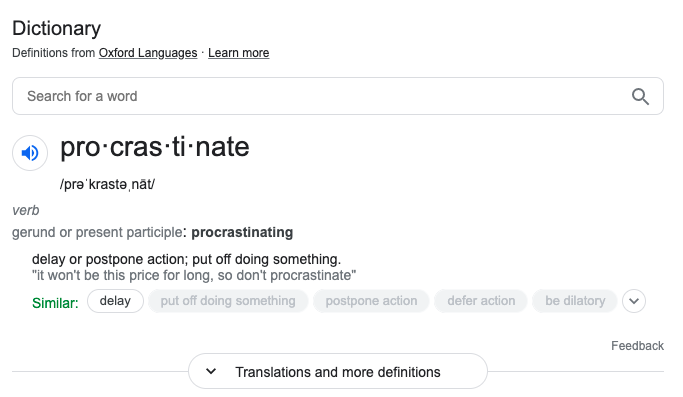As we’re approaching our finals, let's get #ExamReady. This week, I want to talk about procrastination and motivation.
We all procrastinate on some things. Procrastination doesn’t only happen academically, it can also happen to other things that are important (laundry, groceries...). You are certainly not alone when it comes to combatting procrastination and trying to find motivation.
I think we all procrastinate a lot on things that we don’t enjoy. It’s challenging to motivate myself to work on a project that I just can’t connect to. To combat procrastination, I talked to a learning strategist and even attended a Procrastination and Motivation workshop.
One big thing I took away from the workshop is reflection, specifically reflection on our motivation habits. Our lives are driven by habits. Habits can make our lives easy, but they're also easy to overlook if we don’t actively reflect on them, which is why bad habits (i.e., leaving things until the last minute) are difficult to break.
If you're trying to reflect on your own habits, here are two questions to ask:
- What does my procrastination look like?
- How can I change a bit?
Personally, I realize that I take on new responsibilities whenever I feel bored or no longer have the energy to work on my existing tasks. “I’m busy” becomes the reason I tell myself why I’m avoiding something.
Since the workshop, I try my best to work a little bit on the project that I’ve been avoiding. And I’ve learnt that it’s okay to just want to get through a task. You know what? Just push through it.
Procrastination can obviously look different for you. It can be caused by different reasons such as burn out, self-doubt and stress. And don’t blame yourself too much for procrastinating: it is not "just" a simple matter of willpower!
It’s important to reflect on your energy levels. When are you most motivated to work? A tip that was given during the workshop is to use the "5 spoons" strategy. Every day, at different times, ask yourself: How many spoons of energy do I have? If you have 5, then do something that takes a lot of effort (deep work). If you only have 1, then take on shallow work.
(If you are curious about what I mean about deep and shallow work, check out my time management reflection)
I found the strategies discussed in the workshop to be really valuable. I have implemented those tips bit by bit in my life, especially on days when I’m wanting to be more self-aware of my situation. And you can do this too!
Next week, Academic Success is holding a Night Against Procrastination (NAP) on March 31st. You can find the workshop I mentioned above, along with things like Study Hubs, research supports and fun events. There will also be free snacks in Robarts Library that evening, to help you recharge! You can find more information at the link.
No matter where you’re at in your combat against procrastination, I’m proud of you for trying your best to get things done! Good luck with exams <3

0 comments on “You’re not alone when it comes to procrastinating”